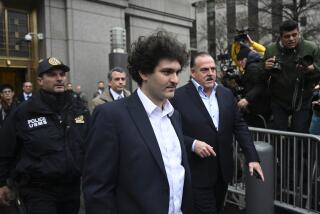Buffett infusion bucks up Goldman
- Share via
NEW YORK — Wall Street giant Goldman Sachs Group Inc. got a much-needed seal of approval Tuesday from billionaire investor Warren E. Buffett.
Buffett’s Berkshire Hathaway Inc. agreed to invest $5 billion in the investment bank via a purchase of preferred stock, Goldman announced after the stock market closed. Berkshire also will get warrants to buy about 10% of Goldman’s common stock at a discount price of $5 billion.
Goldman said it also would raise $2.5 billion in a public offering of common shares.
Buffett’s move amounts to a huge show of support by the legendary investor in Goldman at a time when the stock market has become deeply concerned about the future of the investment-banking business.
“You’ve got the most renowned investor of the 20th century putting money into Goldman,” said Scott Schubert, an investment banker specializing in financial companies at Jefferies Putnam Lovell in New York. “It’s a vote of confidence in Goldman and in Wall Street in general.”
Buffett’s money isn’t coming cheap.
Berkshire will earn a hefty 10% dividend yield on the preferred shares. The warrants give Berkshire the right to pay $115 a share for Goldman’s common stock -- $10 a share less than its closing price Tuesday -- any time between now and five years from now.
The deal gave Goldman’s shares a pop in after-hours trading to $135.87. In regular trading, the stock finished up $4.27 at $125.05 after falling as low as $113.
If the after-hours price of about $135 holds up until the deal closes, Berkshire would immediately have a paper profit of $870 million on the warrants.
Goldman has long been Wall Street’s premier investment bank, but it too has been clipped by the turmoil rippling through the financial markets.
Despite remaining profitable throughout the housing downturn, the viability of Goldman and Morgan Stanley, Wall Street’s last two major independent investment banks, was put into question by the fall of Lehman Bros. Holdings Inc. and the forced marriage of Merrill Lynch & Co. to Bank of America Corp.
The investment banks’ business model has increasingly been criticized for its reliance on the capital markets for funding -- as well as on the vast leverage and risk-taking that have become central elements of the companies’ businesses.
Even after the government proposed late last week to buy troubled mortgage-related securities, investors fear that continuing write-downs of such assets could deplete the capital of even the strongest financial institutions.
“It was absolutely necessary for Goldman Sachs to raise the funds,” said Richard X. Bove, an analyst at Ladenburg Thalmann Inc.
Lloyd Blankfein, Goldman’s chief executive, said the firm considered Buffett’s capital infusion “a strong validation of our client franchise and future prospects. This investment will further bolster our strong capitalization and liquidity position.”
The Federal Reserve on Sunday said it was giving Goldman and Morgan bank-holding company status, allowing the firms to rely more heavily on consumer and business bank deposits to fund themselves.
But the price for bank-like stability will be tighter Fed regulation of Goldman and Morgan -- and far less profit potential.
Buffett apparently has no problem with that.
“Goldman Sachs is an exceptional institution,” he said in a statement.
“It has an unrivaled global franchise, a proven and deep management team, and the intellectual and financial capital to continue its track record of outperformance.”
In 1987, Buffett paid $700 million for a 12% stake in Salomon Inc., then Wall Street’s largest investment bank. After the government in 1991 accused Salomon of trying to corner government securities markets, Buffett stepped in as chairman of Salomon to save its reputation and get it back on track. The firm was later acquired by Travelers Group, a predecessor of Citigroup Inc.
--
Hamilton reported from New York, Petruno from Los Angeles.
More to Read
Inside the business of entertainment
The Wide Shot brings you news, analysis and insights on everything from streaming wars to production — and what it all means for the future.
You may occasionally receive promotional content from the Los Angeles Times.










